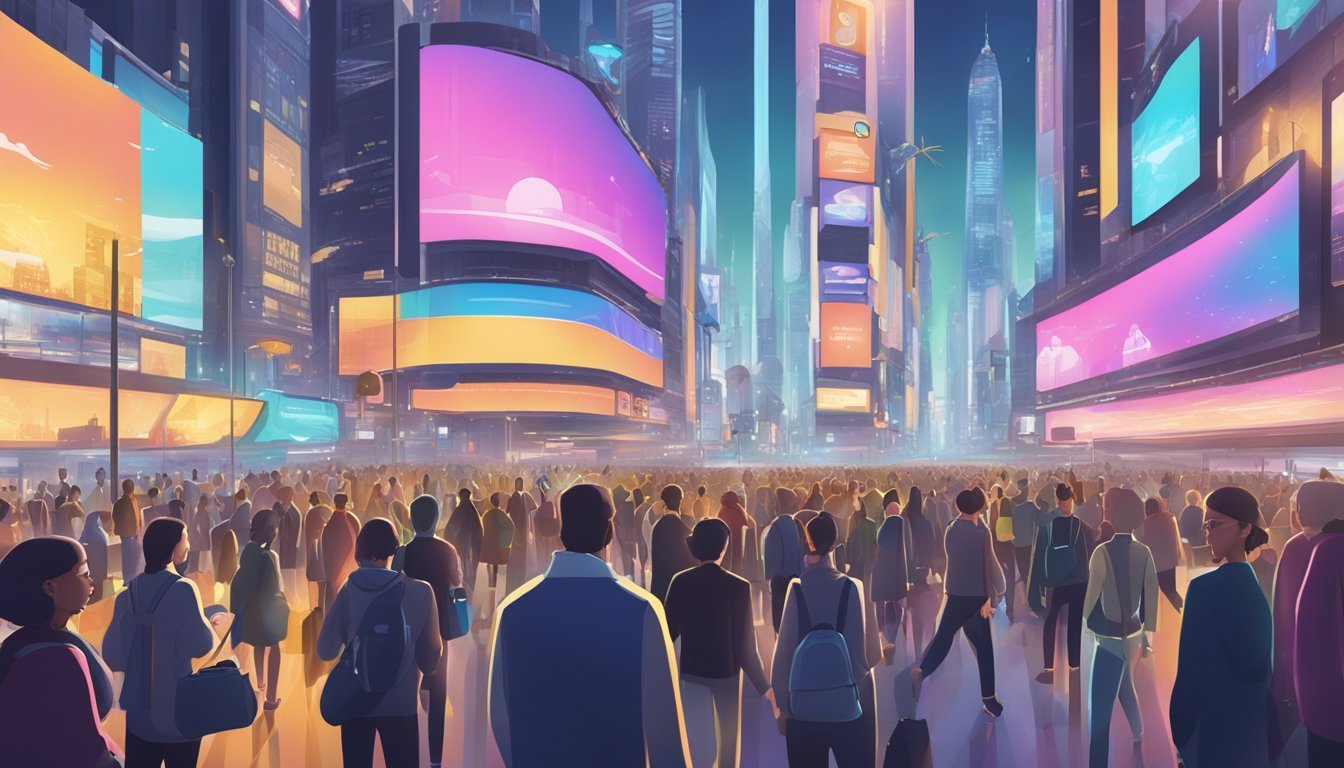Metaverse Business Boom: Unlocking the Digital Economy's Future
The metaverse presents a new frontier for businesses, offering a digital landscape where users can interact, create, and experience virtual environments in ways that mirror the physical world. It expands upon the idea of virtual reality, blending technology with everyday life to create an immersive space for innovation and commerce. Companies see the metaverse as an evolution of the digital experience, with opportunities to revolutionize how they engage with customers and conduct operations. The metaverse's potential to become a vast ecosystem for business is not just theoretical. Large tech companies have already made significant strides, as evident from Facebook's rebranding to Meta, illustrating a commitment to shaping this next-level digital experience.
Business opportunities within the metaverse are diverse and rapidly evolving. They range from digital real estate and virtual marketplaces to innovative advertising strategies and new forms of customer engagement. This digital universe is poised to transform traditional business models, offering a platform for continuous growth and creativity. Moreover, the integration of technologies like augmented reality can enhance the user experience, merging online and offline worlds to create more dynamic customer interactions. With augmented reality experiences becoming increasingly prevalent, businesses have the chance to reach consumers through novel and interactive mediums.
The expansive nature of the metaverse creates a fertile environment for startups and established businesses alike to explore untapped markets and construct their own unique digital spaces. As investments flow into metaverse-related companies, it is clear that both interest and confidence in this virtual economy are surging. Developing a presence in the metaverse now could be a critical move for businesses aiming to stay ahead in the digital curve. While the full scope of what the metaverse will become is still unfolding, it represents a significant leap forward in how companies can think about and deliver value to their customers.
Understanding the Metaverse
The Metaverse represents a significant evolution of digital spaces, offering new infrastructure and immersive experiences. It utilizes advanced technologies like VR and AR, and operates on principles of interoperability and blockchain.
Evolution of Digital Worlds
The Metaverse has grown from simplistic digital worlds, such as Minecraft, to complex environments with robust economies and social systems. Industry analysts like Gartner point out that the Metaverse is not a single space but a collective of interconnected realms, evolving from traditional gaming platforms to expansive virtual ecosystems.
Metaverse Infrastructure
Essential to the Metaverse are its underlying technologies, such as blockchain for security and commerce, and the interoperability protocols that enable different virtual spaces to connect. Nvidia's Omniverse platform exemplifies an infrastructure that allows for real-time simulation and collaboration across various applications.
The Role of Virtual Reality and Augmented Reality
Virtual Reality (VR) and Augmented Reality (AR) are pivotal in the Metaverse, allowing users to dive into fully immersive environments or overlay digital information onto the physical world, respectively. The technology giants like Meta and Google are investing heavily in these areas to improve user experiences in the Metaverse.
Extended Reality and Immersive Experiences
Extended Reality (XR) is the umbrella term encompassing VR, AR, and other immersive technologies. It is fundamental in creating immersive experiences that are becoming integral to various industries—from entertainment to education. As the Metaverse matures, XR is anticipated to play an increasingly central role in how people interact with digital content and with each other within these spaces.
Business Models in the Metaverse
The metaverse offers diverse business models leveraging cutting-edge technology, where entities such as NFTs, cryptocurrency, and gaming redefine how value is created and exchanged.
Virtual Goods and Services
Virtual goods in the metaverse, often represented as NFTs (Non-Fungible Tokens), provide a significant revenue stream for businesses. These digital assets, ranging from clothing for avatars to virtual real estate, are unique and ownership is verified on a blockchain. Services such as legal advice and event planning are also finding a place in the metaverse, capitalizing on the growing demand for metaverse experiences.
Play-to-Earn Gaming
In the realm of gaming, the play-to-earn model stands out, merging entertainment with potential income. Players can earn cryptocurrency or NFTs by achieving goals or winning battles, which can then be traded or sold in the real world. This not only enhances engagement but also opens up new marketing avenues for businesses within the gaming sector.
Digital Twinning in Business
Digital twinning, the creation of a virtual counterpart to a physical business process or asset, allows for real-time simulation and analysis. In sectors from manufacturing to urban planning, digital twins in the metaverse aid in optimizing operation, reducing costs, and fostering innovation without the risk associated with altering their real-world counterparts.
Advertising and Brand Experiences
Advertising in the metaverse transcends traditional models, offering immersive brand experiences that engage customers in a novel way. Businesses use virtual spaces for interactive marketing, such as exclusive events or virtual product launches, blurring the lines between advertising and entertainment, thereby potentially increasing audience engagement and brand loyalty.
The Creator Economy and User-Generated Content
The metaverse catalyzes the creator economy, where user-generated content is not just encouraged but monetized. Content creators can design and sell virtual goods, create experiences, and offer services, all while utilizing platforms' tools and marketplaces that support the sale and trade of digital assets like NFTs. This democratization of creation and commerce empowers individuals and could disrupt how businesses approach content and product development.
Enterprise and Industry Adoption
The migration of industries into the metaverse signifies a transformative phase where enterprises explore digital spaces for growth, innovation, and enhanced consumer engagement. Firms are recognizing the metaverse as not just a theoretical concept but a practical platform, where businesses such as Meta and Microsoft are paving the way, and applications range from virtual training to urban planning.
Healthcare and Virtual Training
In healthcare, the metaverse serves as a potent tool for virtual training and simulations, providing medical professionals with interactive and realistic environments. Companies leverage this for surgical rehearsals or for explaining complex procedures to patients. Utilizing digital twin technology, healthcare systems can create accurate models of human anatomy, allowing for detailed study and practice without risks.
Retail and Fashion
Retail giants are exploring the metaverse to embellish the shopping experience with a unique flair. Brands like Nike have established their presence in platforms such as Decentraland, offering virtual merchandise that complements their physical offerings. This not only acts as a new revenue stream but also as a testing ground for emerging trends.
Education and Virtual Learning Environments
Education institutions integrate metaverse technologies to build virtual learning environments, paving the way for an immersive learning experience. Through platforms like Microsoft's virtual spaces, students can engage in interactive learning, accessing materials and experiences that transcend traditional classrooms, without geographical constraints.
Real Estate and Urban Planning
In real estate, the concept of digital twin technology is revolutionizing urban planning and property showcasing. Cities like Virtual Singapore are leveraging this to model urban landscapes, allowing planners to simulate scenarios and optimize city designs. Real estate businesses capitalize on this by offering virtual tours of properties, thereby expanding their market reach without the need for physical showings.
Social Impacts and Considerations
The rise of the metaverse brings about critical social impacts and considerations, particularly concerning the safeguarding of privacy and ensuring equitable access. It influences how individuals and organizations interact within digital realms, shaping the evolution of social dynamics.
Privacy and Data Security
In the metaverse, privacy and data security are paramount as increased digital interaction poses new risks for personal information breaches. For instance, platforms like Instagram already collect vast amounts of user data, which becomes even more complex in a fully immersive digital world where user interactions can be more revealing. In response, businesses must implement robust security protocols to ensure that user data is protected and privacy is not compromised, especially during Zoom meetings or other virtual gatherings.
Accessibility and Inclusivity
Accessibility and inclusivity are critical for ensuring that the metaverse is a space where everyone, including those with disabilities, can participate fully. This means creating environments that account for a variety of disabilities, such as:
Visual: Offering text-to-speech options or high-contrast visuals
Auditory: Providing closed captioning and sign language interpretation
Motor: Designing interfaces that are navigable by voice or assistive technology
By considering the pandemic's impact on digital adoption, businesses should also focus on reducing barriers to entry to make these virtual spaces as inclusive as possible, learning from the rapid adoption of technology seen during this period.
Social Connection and Networking
The metaverse offers new avenues for social connection and networking, fundamentally changing how people meet and interact. During the pandemic, individuals relied heavily on digital tools to maintain connections, a trend that is only poised to grow within the metaverse. However, maintaining a balance between virtual and real-world interactions becomes crucial to ensure that the metaverse enhances, rather than replaces, the rich fabric of human connection.
Emerging Trends and Future Outlook
As businesses transition into the metaverse era, there's a significant shift toward integrating digital spaces with traditional commerce, creating new investment opportunities and accelerating technological innovation. However, entities must navigate a landscape filled with both challenges and potential.
Investment and Market Potential
According to a Citi survey, the metaverse could become a $13 trillion opportunity. Investment is flowing into virtual environments where participants can interact in ways similar to the physical world but with enhanced possibilities. E-commerce is evolving within these spaces, as businesses are keen to capitalize on web3 developments. Companies like Meta aim to foster immersive shopping experiences that could redefine consumer behavior.
Challenges and Risks
With the advent of any emerging technology, there are inherent challenges. The metaverse, while offering vast economic potential, poses risks such as ensuring data security and user privacy. Digital currencies and cryptocurrencies offer innovative payment solutions but bring complexities in ensuring regulatory compliance and financial stability. Entities must also consider the profound effects of these shifts on societal norms and legal frameworks.
Next-Generation Technological Advances
Artificial intelligence (AI) and blockchain are cornerstones of this paradigm shift. AI powers innovative experiences, from personalized avatars to intelligent digital assistants in virtual spaces. Blockchain underpins the use of digital and cryptocurrencies, enabling secure, transparent transactions. Together, these technologies are propelling the metaverse beyond simple virtual reality into a fully-integrated platform that could redefine current business models and social interactions.





